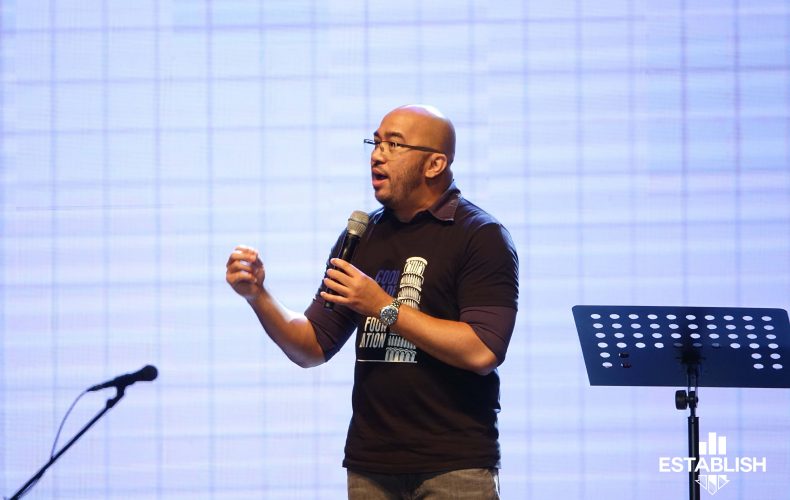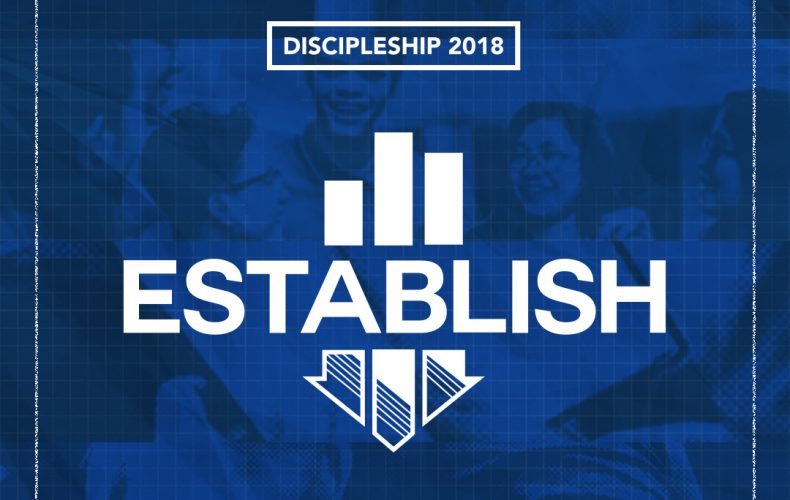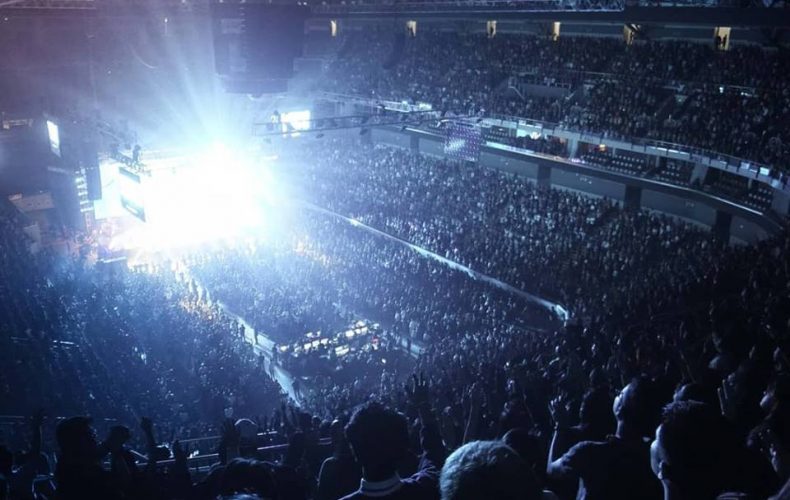The following is a transcript of “Establish in Church Community,” a message delivered by Pastor Gilbert Foliente at Discipleship 2018.
Pastor Steve started off with Acts 2, but how many of you here remember July 16, 1990? Some of you weren’t born; I was two years old, I think, at that time. *laughs* I was in UPLB, I was in a classroom, and our Math professor used to be my classmate, and he became a math professor. Because I loved the campus so much! I believe, when we change the campus, we change change the world, amen?
And there was this very strong shaking, and then he was teaching mathematical equations, and then he stopped, and everybody was running, and everybody was thinking, “What was happening?” And then he stopped, and then the shaking stopped, and then he just continued with his math equations, as if nothing happened. Then there was another tremor, and we said, “We’re leaving here!”
July 16, 1990 was (the date of) one of the strongest earthquakes that our nation had ever experienced. It was 7.7 in magnitude. And sadly, it cost us more than a thousand lives due to some buildings that collapsed. That was 1990. Three years after, it was August when a friend of mine, an evangelist from Every Nation USA, went to Los Baños, and he said they just came from Guam. It was August 1993, and he said he and Pastor Rice were in Guam to do an outreach. They were in a hotel and their room number was 911. They thought something was going to happen; a day or two after they were there, on August 8, 1993, a very strong earthquake struck Guam. It was 8.1 in magnitude. But amazingly, there was not a single structure that collapsed. It was an earthquake that was stronger than the one we had in 1990. The Guam governor said, “We took it with virtually no major injuries and very little damage, and that is because our structures are built to withstand earthquakes.”
Later on, I found that Guam has one of the strictest building codes. It’s Zone 3, they call it, among the whole of the United States territories, because they know that Guam is located at what geologists would often call, “The Ring of Fire.” The Ring of Fire is an area in the Pacific Ocean where the movement of the earth’s plates cause frequent earthquakes and volcanic activity. Because they were in the Ring of Fire, they thought, needing to be smart, “If there’s going to be shaking in this piece of land, then we need to build strong foundations.”
Well, I want to submit to each one of us today that your spiritual life, my spiritual life, all of our spiritual lives, are in the Ring of Fire, and the question is not, “If shakings come…”, the question is “When shakings come, will your life stand?” Shakings will come, and when shakings come, a good façade will not cut it. No matter how nice we are on the outside, or how nice we look on the outside, a good façade will never cut it. It’s only a good, solid, strong foundation that would make us and enable us to stand when shakings come.
Pastor Steve preached from Acts 2:36. I remember, when I was a student, i was invited to a Rock N’ Roll seminar. Some of you still remember that. I went because there’s this beautiful girl who invited me. I followed her and I went there, and I saw Pastor Ferdie preaching Acts 2 after the Rock N’ Roll seminar, and he said, “Let me tell you this Jesus is both Lord and Christ!” I was cut to the heart, and I said, “I have to give my life to Jesus.” And that’s what happened.
Now, in verse 41, it says, “so those who receive his word were baptized”–Pastor Steve talked about that– “and there were added that day about 3,000 souls.” So the question is this. They were added to what? And as we talk about church community today, I want to submit to you that they were added to more than just an organization. They were added to more than just a religious institution. They were added to more than just church membership. They were added to more than just Victory group or small group attendance. They were added to a people. They were added to a community of God’s people, and that’s what we’re going to talk about today when we say we want to establish believers, we want to establish disciples, we want to establish them, not just in being a member of a church, or attending a small group or a Victory group. We want them to be established in a community of God’s people.
What makes church community unique? We live in the world today where there are several communities that you can join. There’s an online community; there’s a gaming community; there’s associations in villages, and parents and teachers, there’s clubs, there’s organizations that we can all belong to, but what makes a church community unique? That’s what we’re going to talk about in the next few minutes.
As you come to him, a living stone rejected by men but in the sight of God chosen and precious, you yourselves like living stones are being built up as a spiritual house, to be a holy priesthood, to offer spiritual sacrifices acceptable to God through Jesus Christ. For it stands in Scripture:
“Behold, I am laying in Zion a stone,
a cornerstone chosen and precious,
and whoever believes in him will not be put to shame.”
So the honor is for you who believe, but for those who do not believe,
“The stone that the builders rejected has become the cornerstone,”
and
“A stone of stumbling,
and a rock of offense.”
They stumble because they disobey the word, as they were destined to do.
But you are a chosen race, a royal priesthood, a holy nation, a people for his own possession, that you may proclaim the excellencies of him who called you out of darkness into his marvelous light. Once you were not a people, but now you are God’s people; once you had not received mercy, but now you have received mercy.
– 1 Peter 2:4-10
We will not read verse 11, but if you continue reading verse 11, it talks about Peter encouraging and exhorting the Christians one how to live. He was telling them, this is how you should live, and how should we live as Christians in this world. He said, you should live as foreigners; you should live as exiles. ESV says sojourners; another translation says you should live as aliens in this world. There is a certain way to live. If you’re a Christian, there is a certain way to live that’s different from the people of the world. I hope you are living a different lifestyle than the people of the world, because there is a certain way to live.
But in verse 11, before he says, “this is how you should live,” he said this. He laid out for them, “This is who you are,” before telling them how to live. He says, This is who you are because our identity dictates our behavior. Our behavior follows when we know who we are. And what did he say? Who are we? He says, “You are a people of God.” He says, “Once you were not a people.” But now, we are a people of God. This is who we are. We are a people belonging to God. This is the church.
There are so many things that we can talk about here but I will focus on verse five, and I want to build on the phrase that he said. He says, “You yourselves are like living stones.” Being built up as a spiritual house. So I want to start with the phrase, “being built.” This is how God built his church. We, as living stones, are being built. Being built is present-progressive; this indicates a continuing action. This indicates something happening right now. God is doing something. God is active in this world, and one of the things He’s active about is building his church, in taking living stones and connecting them together, so that he could build a church. He’s very active in doing that. God is building His church right now.
In other words, God is not yet finished building His church. Why? In Acts 2, we’ve seen that. There was no church. He will build the church. So he used the preaching of the gospel to turn 3,000 dead stones, and with the gospel, He turned them from dead stones into living stones, and He started adding and building them up together. That’s the church! God is still in the business of turning dead stones into living stones.
As we engage them, there many dead stones in your culture, in your community, in your city. There’s millions more dead stones in Manila, and as long as there’s one dead stone out there, outside of our church, we’re not big enough. God wants to turn those dead stones into living stones, and as you engage the dead stones in your campuses, God wants to turn them, and make them alive, and God wants to put His life in them.
But when people turn into living stones, God wants to add them to the church. God is also still in the process of finding living stones who were not added. How many of you know of some living stones who are not added to the church, because they live like “me and Jesus” Christians? They think it’s just about “Me and my relationship with Jesus!” God wants to find those living stones, and say, “No, no, no! It’s not just about you and Me, it’s about you and that living stone and that living stone. I’m gonna be adding you to that living stone. It’s not just about me and my podcast, or me and my webcast. There’s a lot of deception today, to think that if I’m doing podcasts, then I am being built into the church. It’s much more than that. God is not finished yet; He wants to build us together, He wants to add more.
One of the things that we can see about the community of God’s people is this: it’s never meant to be an exclusive club. This, right here, 11,000 people, is not meant to be an exclusive for 11,000 people only. Our small groups are not designed to be an exclusive club; they were just enjoying our time so much. I hope we love them. But you see, our tendencies is always to stay together. As Pastor Steve shared with our pastors about God’s design: if you look at God in the book of Genesis, this is the first people of God, two of them. He said, I’m going to have a people, Adam and Eve. And His very desire is for Him to add to His people, so He said, “Don’t stay in the garden, as much as you love the garden, and as much as you love each other, I want you to go around the world! Fill the Earth, scatter, and add more people, so that they would become my people.” But for us, we would rather stay in the garden, wouldn’t we?
And then, when Noah’s Ark came, Noah would rather stay in the boat, but God said, “I want you to go out, there is a people that I want to add here!” And in Genesis 11, the tower, they’d rather build a tower so high, and enjoy themselves, God had to scatter them, because God is concerned for the people out there. He wants to add them to us.
And in Acts 1, the people of God, Israel, they wanted to stay in Jerusalem. God says, “No, no, no, I want to build my church by turning those dead stones and adding them here. We are not meant to be an exclusive club. It’s meant to be inclusive. Victory groups, small groups, were not called to maintain this small group, and say, ‘I don’t want you to go, let’s stay here,’ and then, thirty years after, it’s still a small group. We’re meant to multiply. Not exclusive! God is adding people.
Another implication of being built… it means that God is not yet finished adding people, but the second is, God is not yet finished in refining the living stones. In other words, we are all still a work in progress. Imperfect. That’s the church! The church is made up of imperfect living stones; we’re not perfect. And theology class, it says that “already but not yet.” We’re already holy, if you look at Peter, he says, “you are a holy nation,” not because of what we do, but because of what Jesus did, and yet, we’re still being made holy with the sanctifying work of the Holy Spirit inside of us. We’re still not perfect; we are a group of living stones that are being justified and being sanctified, desiring to honor God in every way as we live this life.
And if we understand this, that the church is made up of justified sinners being sanctified by the Holy Spirit, then we would understand that the church should have acceptance, not tolerance. We accept one another, yet we speak the truth in love, and because we speak the truth in love, we accept one another, then in the church, in this community, therefore, there is no need to put up a mask. There’s no need to put up a façade, there’s no need to put up a wall, and pretend that I’m okay when I’m not okay, to pretend that I got it all figured out when I haven’t figured it all out.
We need acceptance in this church community. There is nothing to prove and there’s no one to impress. I hope you know that. You go to your small group, nothing to prove, no one to impress. You go to church, nothing to prove, no one to impress, because we are all justified sinners and still being sanctified with the Holy Spirit. We accept each other, rich or poor, young or old, black or white, hair or no hair, male or female, we accept each other. There should be forgiveness, not condemnation. Imperfect people sometimes offend each other, and maybe you’ve been offended by the person seated next to you before. If that person is your spouse, I’m sure you’ve been offended before, but that’s what imperfect people commit. Sometimes you offend each other, and so we need forgiveness, and not condemnation. If we understand that we are being built, then we need allowances, not judgment. Understanding that all of us are weak in some areas and strong in some areas, we can look at people and say, “Wow, Victory group leader ka pa naman, grabe ka.” We make allowances because we’re being built.
Next, “we are being built up” in the ESV, but in the NIV, it says, “we are being built into.” We are being built into something; we’re being added to another life of another person. You see, if the church is the body of Christ, then we cannot be joined to Christ without being joined to His body. So, if you say, “I’m joined to Christ, I have a relationship with Christ,” but the church is the body of Christ, you cannot be joined to the head without being joined to the body, isn’t it? So he said, “We’re being built into the lives of each other,” and he made an analogy of building a spiritual house made of stones. It’s almost like a church made of bricks, but that’s probably a Western context; it’s probably going to look a little bit more like this in the Philippine context: hollow blocks, not bricks. So when you you say, you’re a living stone, the person you’re talking to, you’re a living hollow block. That hollow block right there is you!
Everyone of us, living stones!
But if you look at the building, you should notice this: a few hollow blocks are totally dependent on a hollow block beneath them. And this hollow block is totally dependent on another hollow block under him. That’s how God wants to build His church; He wants to build His church by building your life into my life, by building your life into the life of the other person. It’s way more than more than church attendance; it’s way more than just Victory group attendance. It’s about lives being built together.
I’m not sure how accurate this is, but one preacher said that 81% of Americans say, you can live a flourishing Christian life without having a church at all. I don’t believe that. I believe you can never be joined to Christ unless you’re joined to His body. So the question is this: when it comes to following Jesus, not all of life, okay, when it comes to following Jesus, are you depending on someone? And is someone else depending on you? When it comes to following Jesus, are you supporting someone to follow Jesus, and is somebody supporting you so that you can follow Him? And that only happens in a small group setting. That can never happen in a Sunday service, or Saturday, or Tuesday or Wednesday or Monday, we have services, every day of the week. It happens on a small group basis; it happens in your level, as Victory group leaders and interns, this is where the building of lives happen.
Lastly, being built into a spiritual house. The footnote here says, the temple of the Spirit, God’s dwelling place. The church is designed to be the dwelling place of God; the church is designed where God’s presence resides. Now think about this: if you’ve got a few hollow blocks scattered all around, how many of you want to live in that house? That’s not a house; that’s not livable. You scatter a thousand hollow blocks here, if you don’t put them together, you can’t live and reside in that house. God wants to reside in a spiritual house, His church, and the only way He resides in that church, is when our lives are added together and built into each other. The degree to which our lives are built together is the degree to which His presence is manifested through us.
How many of you want the presence of God to be manifested in your city? How many of you want the presence of God, when somebody steps in Muntinlupa, they would feel the presence of God? When somebody steps in Taguig, when somebody steps in Manila, when somebody steps in Quezon City, they sense the presence of God. That can only happen when we as a church allow Him to build our lives together, and to the degree that our lives are built together, is a degree that we will see the manifest presence of God in our midst.
Let me end by talking about this shirt, Pastor Steve started with this. The leaning Tower of Pisa, and he talked about this, the leaning Tower of Pisa was saved from collapse, when in 1990, they closed it now. And they worked on it for ten years and US$27 million. A lot of work and a lot of money to fix the foundation, and ever since it was on a permanent 13-foot lean. We’re gonna see videos, but later on, we’re going to pray for you, all Victory group leaders and interns, we’re going to commission you. What is the commission? The commission is this: we’re going to commission you to establish strong foundations for every new believer, everyone you disciple, everyone you engage, every new believer that comes into your Victory group, you’re commissioned to establish strong biblical foundations, because you know that their spiritual lives are in the ring of fire. Establish that, let it be strong, so that when shaking comes, they will remain standing.
But not only are you going to be commissioned to establish strong foundations in the lives of new believers, we will commission you to fix foundations. A lengthy process, a lot of work, and it will cost you a lot–ten years and US$27 million (for the Tower of Pisa)–because we believe it’s not yet too late to fix foundations in other Christians. If there’s another Christian that comes into your small group, and you see that the foundation is not fixed, don’t give up on them. Dive into it; put effort, spend in it and invest, because you know if you establish and fix that foundation, then he or she will remain standing, no matter how many shakings or earthquakes come into their spiritual life.
And we have a Church Community class as a tool for you to do that. You’re building your life with them, but there’s a class that serves as a tool for us to do that Let’s pray. Lord, we want to see Your presence in our cities; we want to see Your presence in our nation. We realize that the degree that our lives are built together is the only degree that we can see the manifestation of that presence, so, Lord, we ask You, build Your church, we ask You, build our lives together, we ask You, keep adding dead stones that You’re turning to living stones, keep adding them, keep multiplying our Victory groups, for Your honor, for Your glory, in Jesus’ Name, Amen.





